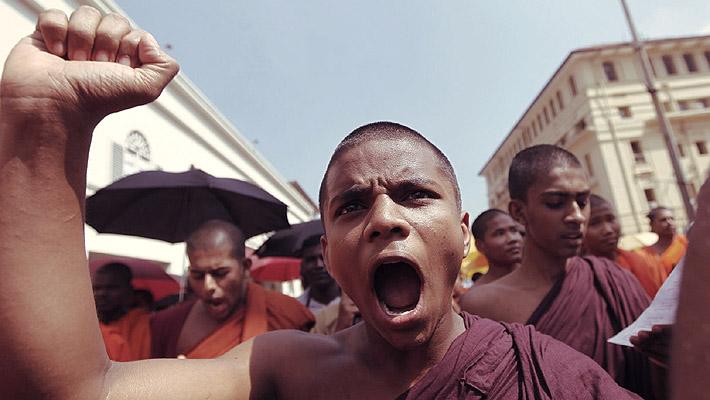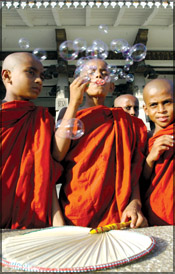By Muhammed Fazl -
“It is a man’s own mind, not his enemy or foe that lures him to evil ways” – Gautama Buddha
Historians of Buddhism in Sri Lanka may or may not have interpreted historical scriptures based on facts or opinions… but none of it matter anymore since Buddhism has lost its value and its importance thanks largely to its ineffectiveness in matters concerning governance, rule of law and social justice. Bitter it may be to some to swallow, but Sri Lanka was never a Buddhist country. The need to look for alternative and effective sources of guidance in leading the masses towards spiritual enlightenment is now a matter of great exigency.
60% of the population claiming to be Buddhists or the belief in the legend where Lord Buddha supposedly had arrived in Sri Lanka centuries ago does not make this a Buddhist country. For it to be rightly called such, it need to be governed by teachings of Buddhism as in the case of Islamic countries where Islamic Sharia is the source of governance. Buddhism as a state religion in this country has been a failure since none of the governments in power paid any serious attention in being guided by its teachings. Sri Lanka with one of the highest cases of rape, suicide, murder, theft, racial intolerance, alcohol consumption and the addiction for gambling has also contributed in negating the influence of Buddhism.
 The Thripitakaya, written 500 plus years after the death of Gautama Buddha with 80,000 plus sermons to follow, how it came to be written or questions of its authenticity is no more important as long as its teachings are useful, if followed that is. Whatever religion one may follow, the beauty of the Buddhist philosophy or its sensibility cannot be easily disputed or denied.
The Thripitakaya, written 500 plus years after the death of Gautama Buddha with 80,000 plus sermons to follow, how it came to be written or questions of its authenticity is no more important as long as its teachings are useful, if followed that is. Whatever religion one may follow, the beauty of the Buddhist philosophy or its sensibility cannot be easily disputed or denied.
The state religion and a religion of tolerance, interpreted, distorted and disregarded by many and being used mostly for profits and politics in present chimes, seeing its teachings being relegated to mere rituals is indeed unfortunate. In order to attract the disinterested lot, copying ritualistic practices from the Hindu faith and construing it as divine ones makes it an even more pathetic sight.
What could have befallen in the ‘land of Buddha’ where erosion of values and practices have resulted in a sense of spiritual bankruptcy, especially amongst the flag bearers of its faith?
Lord Buddha expected his followers to discover the truth themselves and not just believe in what the scriptures say. But this ‘truth’ can be subjective and interpreted in many ways especially when living in a multi-religious country such as ours. Guidance it may be, but how many of our own monks have memorized or know the meaning of the entire scripture, let alone the ones in Pali or Sanskrit languages? As for the ordinary faithful, by and large, belief in Buddhism or the pagan ritualistic practices are somewhat a fashion statement to portray and justify one’s non-existent sense of piety.
Wearing a simple saffron-colored robe does not qualify one to deserve respect when attributes of old-age, wisdom, achievements in the service of humanity or piety does not exist. Rapists, pedophiles, thieves, murderers seeking sanctuary in temple premises donning monk’s robes is a common sight and more often than not, it is as a cover from their ‘colorful’ pasts and as a refuge from prosecution by the long arm of the law.
While the process of ordaining of monks as well as disrobing them are seriously flawed and non-existent in most cases, I always questioned the judgment of my countrymen in bowing down to nefarious characters wearing monk’s robes. Questions arising from centuries old practices such as worshipping or praying to lifeless sculptures/statues, Bo trees, chanting Pirith, tying threads around wrists, anointing oil on the head, and ‘religious’ processions (Peraharas) etc., seriously needs to be addressed when one’s proper conduct is absent or contrary to the teachings of Lord Buddha.
 While Nirvana (Nibbana) can be achieved only when the fire of greed and hatred is extinguished, in practical terms, the state of Dukkha (complete peace) can be achieved only if no money is transacted, when detached from luxuries in life and worldly pleasures, when not in a state of intoxication or when non-violent or not dishonest among other positive attributes. Expecting majority of current day monks to abide by Vinaya (rules of discipline) would be unrealistic and herein arises the question of identifying the pious from the devious.
While Nirvana (Nibbana) can be achieved only when the fire of greed and hatred is extinguished, in practical terms, the state of Dukkha (complete peace) can be achieved only if no money is transacted, when detached from luxuries in life and worldly pleasures, when not in a state of intoxication or when non-violent or not dishonest among other positive attributes. Expecting majority of current day monks to abide by Vinaya (rules of discipline) would be unrealistic and herein arises the question of identifying the pious from the devious.
One’s piety is for himself/herself and for them alone the rewards for their good deeds. Their actions, sincere or otherwise, need not have a bearing on another or for it to be a reason for worship. The Muslims that I am, I believe only the God above knows the level of piety among his creatures. Hence, I seriously question the actions of my countrymen in bowing down to another mortal who in reality could be a child molester, rapist or a murderer etc.
Most of the Buddhist temples in this country are cash cows and havens for pedophiles and the deprived homosexuals. Little boys as young as six are left at the mercy of grown up men who supposedly have ‘denounced’ sexual relationships and who claim to live a ‘life of celibacy’. Men and women were created to love each other, so it is in line with nature for one to be attracted to the opposite sex. Deprivation often leads to the unnatural kind, mostly involving minors who are vulnerable and easily available in these situations. When little Samaneras (little boys) get used to living with the forced pleasurable pain, they too learn to impose themselves on the vulnerable when they grow up. The cycle continues with a strict code of silence largely due to abandonment by their parents when young and when left with no other alternatives for sustenance outside the temple premises. Research has taught us that sexual violence are perpetrated mostly by men who were themselves victimized when young.
Investigating activities of every Buddhist temple in this country would reveal the prevalence of misappropriation of charity funds, homosexuality, escapades of sex between monks and prostitutes and Tele-drama actresses, alcohol/drug abuse and child abuse among others. Inactions of the four Mahanayake chapters in eradicating the abuses and corruption would also make them complicit should they continue with their silence. Unfortunately, the relationship between every government in power and the Buddhist clergy is so strong, that an impartial investigation in to the activities of monks and their ‘places of worship’ would never see light of day.
Crusaders of justice that we all should be, this is my personal attempt in rescuing my Sinhala Buddhist brethren from the evil that has engulfed them all along. In the meantime and in conclusion, I sincerely hope concerned authorities would address the following issues and concerns,
1. Why Buddhist temples are allowed to collect funds when it is the responsibility of the State to protect and foster Buddhism? Is it also not a code of conduct in the Buddhist Vinaya for the monks not to handle money? And if they do, will it not lead to misappropriation and abuse of public funds? With so many accusations levelled at Islamic places of worship for raising money which could fund ‘Islamic extremism’ as allegedly, is it not evident with outfits like BBS linked temples instigating terror and violence against minorities only after raising vast amounts of funds?
2. What is the criteria in ordaining a monk and if exist a system to disrobe them when they act on the contrary to its teachings, has it ever been exercised? And if so, why wasn’t BBS general secretary Gnanasara not punished or disrobed for his despicable behavior?
3. Is it legal for children to be trained in monkhood when they are young as six and when their primary education should be made compulsory? Would it be correct to force religious teachings and religious teachings only when they are little kids and prevent them from having a normal childhood and dreams of a life of their choice?
4. Does the Child Protection Authority visit any of the temples if not all of them to investigate cases of pedophilia and child abuse? And would it be safe to leave them in the company of unrelated males with no women to look after them? Would it also not be advisable for the Authority to make regular visits to inspect the wellbeing of children in the care of monks?
5. What is the role of the Ministry of Buddha Sasana vis-a-viz temples? Shouldn’t they implement a code of conduct and also look into modern day Buddhist beliefs and practices?
6. If monks are allowed to dabble in politics, would it be unfair to other political parties since temples attract tax free funds and also enjoy many subsidized facilities since they are registered as charity organizations.
7. If monks are allowed to enter the political arena, would it not be a case of using religion (which is most dear to a sizable section of the ignorant voter base) to achieve power and wealth?
8. Why the age old practice of veneration of another mortal and the need to give prominence and priority in public places, buses, trains etc., when one’s faith is a personal matter?
*The writer is an independent social/political activist and can be contacted on muhammedfazl@msn.com and through FB Fazl Muhammed Nizar

No comments:
Post a Comment